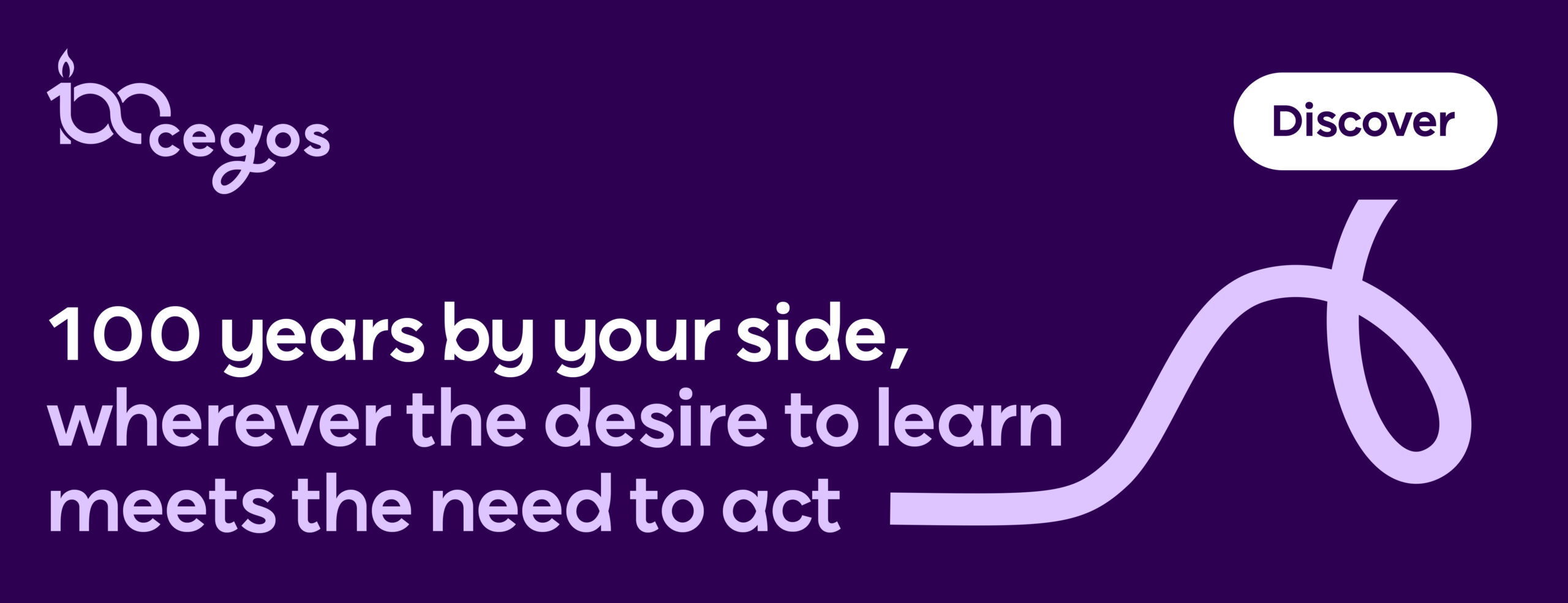
Sales skills trends: from business developer to data analyst

How digital transformation has and will continue to impact sales and customer relationships? What are the more relevant skills for sales professionals in today’s world? What key skills will be required in the years to come?
New L&D trends in Sales and Customer Relationship: balancing hard skills with the human touch
“Act in the present. Think in the future.” It’s easier said than done! However, when you work in Learning and Development (L&D), anticipating trends is not an option but a must. L&D professionals are the ones upskilling and re-skilling the future workforce.
The Future of Jobs Report, published recently by the World Economic Forum (WEF) (May 2023), estimated that by 2027, 61% of the current workforce will require re-skilling or upskilling. However, almost half of this training is not yet accessible; 12% until 2027 and 15% in the foreseeable future. Challenging!
Cegos’ Expert Club is one of the ways how we at Cegos are responding to this challenge. Talented professionals from different backgrounds come together in an open discussion to provide educated yet uncompromised fresh insights on foreseeable evolution of different topics. The second Expert Club that was held discussed Sales and Customer Relationships.
The relevance of L&D’s focus on sales is well attested in WEF’s cited report which considers Business Developers as the second key professionals for business transformation in Europe, immediately after Data Analysts. Two very different professions… or not? The answers of our experts are below.
How digital transformation impacts sales and customer relationship?
Digital transformation in all its forms or sub-products - social networks, big data, AI, etc. - has been stretching the process of selling. This is now almost a continuum that starts long before the deal is closed and goes far beyond it. A lot of things happen before and after the sale. These are now the critical stages and require our attention and a specific set of skills (Filipe Luz).
The most obvious: social selling. To be visible in the increasingly big sales pool (Emanuele Castellani) you must know where and how to be present (relevance, consistency, interactions…). Social networks are, for many activities, one of the most important fields for prospecting (Ruben Munoz). Where opportunities are found, and first contacts are made.
In order to succeed in Social Selling, you have to work on your personal and brand reputation. They are strongly linked and of course it’s crucial to build your credibility, both on social networks and other contexts. Thanks to the digital transformation, we have other contexts and places where meeting clients, where they decide, so social selling is for sure one of these new places and you have to be able to be distinctive anticipate and share new trends. (Silvia Martinelli).
As opportunities are at the core (Emanuele Castellani) of any sales approach, social prospecting skills are and will be in the foreseeable future a must-have. The ability to transform these opportunities and positively impact all stakeholders lies on different factors. Among which, traditional sales skills (listening, questioning, persuasion, negotiation, closing,…) are applied to this new fast speed hybrid context and on the ability to build credibility (Emanuele Castellani) there. It is important to stand out there regardless of credibility being also built online and strictly related with brand (personal or organizational), it goes beyond one and the other. Today, as in the past, credibility demands much more than marketing work. This hasn´t changed.
Credibility is a prior, it is the beginning and shapes the whole sales process. Credibility is one of the enablers of the relationship (with client) that desirably reinforces it and is reinforced by it. In fact, credibility and relationships are the foundations of the whole sales process. As a foundation, credibility should be leveraged on a strong knowledge of the market, client, and products to construct a solution that delivers value to that specific client. Buying decisions can be emotional, namely in B2C, but buying is an increasingly informed decision and highly conscious (Emanuele Castellani).
Credibility and relationship are strongly linked, today more than ever salespeople as to be competent and bring solutions to their clients. Customers ask to work together with a consultancy approach and shared the possible solutions with a partnership approach (Silvia Martinelli).
If becoming trusted advisors is in fact “how we continue selling” (Heater Bunney), at its best, the initial sale is now just one step in the continuous circular process and here again credibility plays a crucial role (Emanuele Castellani) in the efficacy of the sale after-sale (in traditional sales jargon, client retention or engagement, up-selling and cross-selling).
To be credible, salespeople can’t avoid walking the talk. This requires them to be ready in all steps of the sales cycle – from the first interaction with the market until the after-sale - to base and/or translate decisions, actions, and offers in data. This is when the Business developers become at least partially data analysts.
What are the more relevant skills for sales professional in todays’ world?
Undoubtedly, the wide variety of data available opens new doors to sales professionals along the whole sales cycle. However, the first question seems to be: how to survive it? How to take advantage of the data without being overloaded by it? (Cátia Silva). AI plays, of course, an important role when it comes to analysing large amounts of data (Silvia Martinelli) and it is difficult to imagine any data driven approach without it. The integration of Big Data and AI in sales processes creates a demand for new skills. Sales professionals need to develop competencies in data analysis, AI-driven tools utilization, and interpreting insights (Heather Bunney).
This is fundamentals, data driven approach allows to design a strategy and reading data and listening to clients give to salespeople all the elements to anticipate and influence the future. (Silvia Martinelli). Undoubtedly, the first step should be to make sales professionals comfortable around data (Silvia Martinelli). Data literacy will not only allow them to make the most of it but also will empower them, giving back some sense of power (Filipe Luz) by desirably contributing to a more balanced relationship between human and machine and allowing a smoother digital transformation of sales teams.
Positioning is deciding which segment(s) to target and which business value proposition (Emanuele Castellani), to ask the right questions (Heather Bunney and Ruben Munoz), to give the right replies (Emanuele Castellani) and to personalize (Heather Bunney) even more the service or product in search of the best win-win every time. Then, of course, critical thinking continues to be needed to interpret data (Filipe Luz), know how to use the information and insights it provides to support decision, and enhance performance at the different sales stages to ultimately find the best strategy (Silvia Martinelli).
These are not new actions for sales professionals, but the quantity and quality of data available give them a completely different reach and impact. This also focusses our attention again to an all-time classic in professional training, time management, more specifically how to set priorities (Filipe Luz and Emanuele Castellani) and give sales mangers new possibilities and new challenges for the analysis, planning, and execution of their sales team (Heather Bunney). The conversations should start there, by setting objectives, benchmarking, results, and then market (Emanuele Castellani). The starting point for salespeople’s development now is understanding data and how to use it.
With the introduction of AI technologies, salespeople may witness a shift in their roles and responsibilities. While AI can automate certain tasks, salespeople are increasingly required to focus on building strong relationships, providing consultative guidance, and delivering personalized experiences (Heather Bunney). Does this mean that salespeople skills are now all about data and are mostly hard skills? Not quite. Recent findings in neuro-selling, where neuroscience is utilized to gain deeper insights into clients and shape effective communication and negotiation strategies, further validate the significance of emotions in purchasing decisions, reinforcing the pivotal role of relationship, credibility, and trust (Silvia Martinelli).
This is the first time that we've both soft skills and hard skills so much combined in sales (Heather Bunney).
Conclusions
In the dynamic world of sales and customer relationships, digital transformation and the availability of vast amounts of data have brought about significant changes. The integration of social networks, big data, AI, and other digital advancements has expanded the sales process, making it more continuous and complex. Salespeople now need to adapt to this evolving landscape by acquiring relevant skills and embracing new approaches.
While the availability of data and technological advancements impact the sales profession, the human element remains critical. Sales professionals should focus on building strong relationships, understanding clients' emotional decision-making processes, and delivering personalized experiences. These power skills, combined with data-driven approaches, enable sales professionals to navigate the evolving sales landscape successfully.
In summary, the new L&D trends in sales and customer relationships revolve around adapting to digital transformation, harnessing data-driven insights, building credibility and relationships, and balancing hard skills with the human touch. By embracing these trends and developing the necessary competencies, sales professionals can thrive in today's ever-changing business landscape.
By embracing these trends and developing the necessary skills, sales professionals can thrive in today's ever-changing business landscape. In the Cegos’ Expert Club on Sales, have been identified 12 skills fundamental for salespeople discover, create, and make the most of opportunities:
- Build Credibility and Relationship
- Data literacy
- Digital Literacy and Collaboration
- Critical Thinking
- Organization - Set priorities – Time management
- Adaptability, Flexibility and Resilience
- Communication
- Prospecting and Social Selling
- Emotional Intelligence and Neuro-selling
- Consultative selling
- Negotiation and closing
- Client Management (Engagement, up-selling and cross-selling)
The table below shows each skill by its pertinence in the different actions of the sales cycle.

Should you wish to find out how Cegos can help you upskill your sales and customer relationship teams, contact us.










